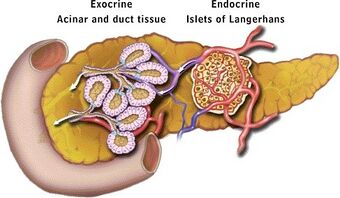Medicine:Type 3c (Pancreatogenic) Diabetes
| Type 3c (Pancreatogenic) Diabetes | |
|---|---|
 | |
| A model of the pancreas and its main locations for exocrine and endocrine functions. |
Type 3c diabetes (also known as Pancreatogenic diabetes) is a form of diabetes that is being researched. It involves the exocrine and digestive functions of the pancreas. Out of all the diabetics, 5–10% may actually be type 3c diabetics. In 80% of people who suffer from this condition, chronic pancreatitis seems to be the cause.[1]
Presentation
Complications
The same complications that occur for other types of diabetics (type 1 and type 2) may occur for type 3c diabetics. These include retinopathy, nephropathy, neuropathy, and cardiovascular disease. Patients with this condition are advised to follow the same risk-reduction guidelines as the other diabetics do and keep blood sugars as normal as possible to minimize any complications.
Cause
There are multiple causes. Some of which identified are:
- Pancreatic disease
- Pancreatic resection
- Chronic pancreatitis (caused by exocrine insufficiency, maldigestion, and malnutrition).[2]
- Lacking genes in the E2F group.[3]
More possible causes are being researched.
Diagnosis
| Diagnostic Criteria for T3cDM |
|---|
| Major criteria (all must be fulfilled): |
|
| Minor Criteria: |
|
Management
The condition can be managed by many factors.
Lifestyle Modifications
Avoiding toxins to the body such as alcohol and smoking reduce pancreatic inflammation. Also, eating a diet rich in fiber and consuming normal amounts of fat may help. Oral pancreatic enzymes may be given. Maintaining sufficient levels of vitamin D can also reduce symptoms and help manage the disease better.
Medications
Medications such as insulin may be given in order to lower blood sugars. For not so high blood sugars, oral treatments in the form of a pill or capsule may be given.
See also
- Diabetes mellitus
- Pancreatitis
- Exocrine pancreatic insufficiency
References
- ↑ Ewald, Nils; Hardt, Philip D (2013-11-14). "Diagnosis and treatment of diabetes mellitus in chronic pancreatitis". World Journal of Gastroenterology 19 (42): 7276–7281. doi:10.3748/wjg.v19.i42.7276. ISSN 1007-9327. PMID 24259958.
- ↑ "Diabetes in Chronic Pancreatitis". Anand R. Gupte and Chris E. Forsmark. https://www.medscape.com/viewarticle/830690_4.
- ↑ "Study shows molecular mechanism behind type 3c pancreatic diabetes". August 29, 2012. http://www.news-medical.net/news/20120829/Study-shows-molecular-mechanism-behind-type-3c-pancreatic-diabetes.aspx.

